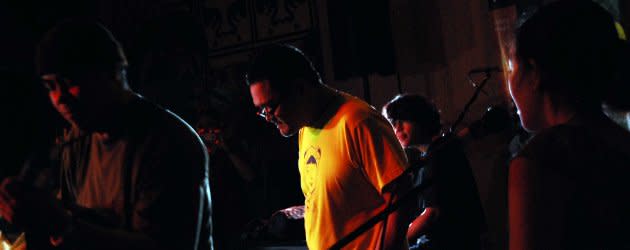Human + Folk = Pinoy World Music
By Tony Maghirang | Coke Music Studio
Fri, May 20, 2011
Humanfolk is a collaborative project anchored on the musical bond between acclaimed jazz guitarist and record producer Johnny Alegre, and avant-garde musician Susie Ibarra.
Johnny Alegre has done seminal work on Pinoy rock and jazz starting from the '70s and his more recent releases with his super-band Affinity have caught the attention of jazz aficionados as far as London and Los Angeles. Fil-Am artist Susie Ibarra, named best percussionist in the 2010 Downbeat Magazine international readers' poll, has worked with such new music leading lights as Matthew Shipp, David S. Ware, Mark Dresser and the late Derek Bailey.
Alegre and Ibarra met while Susie was engaged in research on indigenous Philippine music. Their initial work on a suite composed by Johnny Alegre and news that Johnny was jamming with rising star Susie Ibarra attracted like-minded musicians to their fold including renowned bassist Cynthia Alexander, sound designer Malek Lopez, keyboardist Abby Clutario and Susie's husband, Cuba-born drummer Roberto Juan Rodriquez whose musical chops were honed in the orchestra of the great composer Israel "Cachao" Lopez.
Expansion of repertoire
The cross-pollination of individual talents inevitably expanded the collective's repertoire to new music that incorporates native elements in internationally recognized folk-jazz genres. The nascent Humanfolk naturally leaned towards world music.
Johnny Alegre remembers with pride, "We recorded half the album in one afternoon, 5½ songs actually—five real songs and two ethnic jams. The music had gongs from the Muslims and bamboo instruments from the Igorots. We practically fused elements of our Northern and Southern musical traditions---North meets South!"
The Humanfolk project was a daunting enterprise even for a thirty-year veteran in the Pinoy rock and jazz scene. It also took a while for the project to complete mainly due to conflict in schedules of the multi-national group members. The gaps between sessions would stretch for a year or so on end.
Johnny remembers, "There would be a flurry of activity for a few months. Then Susie would go home to America and go on tour, and the rest of us would all go back to our regular gigs.
"In the end, the project was worth it. I was in good company so I had a feeling we were up to something special. We were actually just exchanging knowledge and the whole thing just fell together."
Natural and graceful mesh
On record, the meshing of traditional Filipino and Western instruments sounds natural and graceful even. While Johnny's electric guitar wizardry has potential to overwhelm, the simple yet tight production gives space for the other players (and their tools—kulintang, keyboards, samples, bongos, etc.) to shine. It's probable that the long wait between studio takes also allowed for fresh inspirations culled from numerous sources to seep into the final proceedings.
Only the opening track "Para Sa Tao" has lyrics and its clincher echoes the Filipino alphabet as in .. pa ra sa ta u wa ya!. The other cuts with titles like "Humanfolk-1", "HF-3", and "Bon Talk" are wordless compositions devoted evidently to display the instrumental dexterity of the musicians involved.
Fortunately, each of the instrumentals has its own hook such as the "Ventura Highway" acoustic guitar strum of "Humanfolk-1" giving way an expansive samba tune. "Humanfolk-4" resounds with the chance meeting of Eumir Deodato and a humming-bird Flora Purim while "Ethnic-HF3" has Seventies jazz fusion written all over its genetic code. Final track, a radio edit of "Para Sa Tao", has a little 3-minute surprise beyond the 7-minute playing time.
Performance
Performed live during the press briefing of the album's release, selected songs drawn from Humanfolk came out alive and kicking, with Alegre and a guest drummer rocking the venue. The overall kinetic interplay of the ensemble headed towards progressive jazz/rock, cool enough to transport most heads to another world.
When asked about the commercial prospects of the album, Alegre said, "I requested my record label MCA to let me do a world music album instead of a new Affinity recording. I argued, 'Let's bring our (Pinoy) music to the rest of the world. Para sa bayan na 'to!'"
MCA Music Phils. managing director Ricky Ilacad could only concur: "I've personally seen how hard these guys have worked for their music. I believe the Humanfok project is as much our way of giving back as theirs."

No comments:
Post a Comment